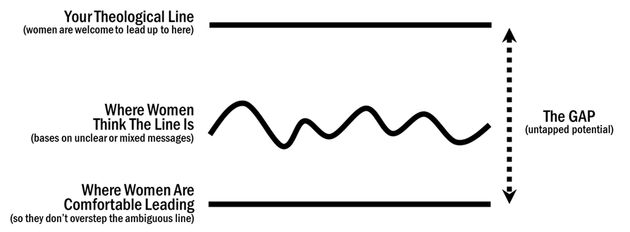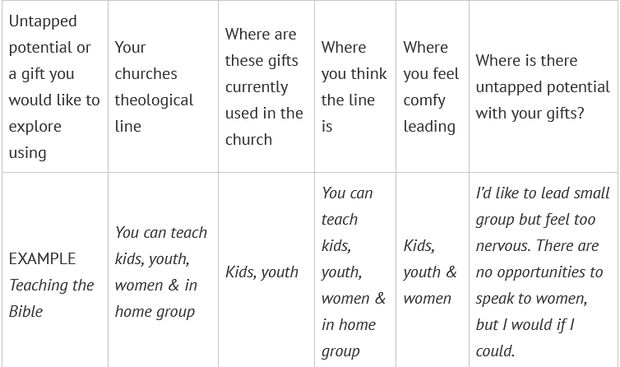Take time to evaluate where you are at with inconsistency with women’s roles in your church, listen to how that makes women feel.
![Photo: [link]Fa Barboza[/link], Unsplash, CC0](https://cms.evangelicalfocus.com/upload/imagenes/618e9de878f13_fabarbozaspeech940.jpg) Photo: [link]Fa Barboza[/link], Unsplash, CC0
Photo: [link]Fa Barboza[/link], Unsplash, CC0
“Employees who experience role clarity are 53% more efficient and 27% more effective at work than employees who have role ambiguity” (source)
Recent research shows that clarity in the workplace is essential for workers. I’ve been wondering if the same is true for the church?
For decades I’ve seen women sent by their church to work abroad, they end up leading, pioneering & teaching in churches. Yet when back at their home church they are barely allowed to do more than give an interview.
Am I alone in observing this?
Maybe you’ve experienced this yourself? Within a parachurch organization you’re free to lead and yet within your own church these opportunities don’t present.
Or perhaps you’re invited to teach at the church plant but not at the main church. Or maybe its inconsistency in another area.
In this blog I’m not talking about how much women are asked to do when they are home on furlow, I’m not addressing specific theological positions on women in ministry.
What I’m questioning here is inconsistency within a theological framework.
I want to honour and respect different view points of the role of women in the church. But I want to question inconsistency on the role of women in church and I want to communicate what it feels like.
I’m interested in looking at inconsistency in women’s roles within the church. Here are a few examples from friends that shows a level of inconsistency…
“I was encouraged to go on a summer team, be involved in public evangelism yet when I returned home, I wasn’t even allowed to give a report in the church service, a male youth leader read it on my behalf”
“I’m financially supported by my church to help church plant in Europe, as part of this I lead, teach and train others, back in my sending church this just simply wouldn’t be allowed”
“My church regularly invites me to speak at the plant church, they haven’t once invited me to speak at the main church”
This isn’t a new problem. By 1900 there were two missionary women in China for every male missionary. These Western women found themselves gifted for work in teaching and evangelism in ways which would have been impossible in their churches at home.
Valerie Griffiths writes in her book Not less than everything:
“In the 1900s If the call of God came to women in Britain, it had to be lived out in a Western culture cluttered with centuries of history and traditions that sometimes had little to do with the Christian faith, but constrained them as Christian women. In China away from all that, they were set free to take up opportunities of service unknown in most of their home churches today”.
So the problem isn’t new, its been around for awhile.
Because women couldn’t serve in churches they went overseas. If women can’t serve in their home church, then let them serve abroad, this was the ethos of church leaders and missionaries from the 1800s.
I’m sure the church outside of the UK has benefited from many gifted and Godly women. But for me there are many problems with this. As Eddie Arthur in a recent tweet replied: “This says so much about how we view both women and Christians outside of the West.”
But to keep focused, I want to concentrate on the impact inconsistency has on women in the church. How does this inconsistency and lack of clarity affect women?
Here is what some women have said about this lack of clarity and how it impacts them…
“Its extremely demoralizing for a teenager. I’m sure it's even more frustrating for grown women who only want to tell everyone about the work they are doing for God”
“I’ve seen this a lot and have been really confused by it. If a church holds the view that it is not for women to lead and stand by this in their church in the UK, why is is ok for them to send a woman out to lead a church often in a less affluent and more dangerous part of the world? It leads me to wonder if there is a very concerning view that people of other countries and cultures are ‘less than’ adult men and women in the West and therefore it’s ok for a woman to teach them”
“When a church is inconsistent I find it frustrating. It can definitely leave women in a position where they have uncertainty about what they are ‘allowed’ to do in a church, meaning they won’t volunteer for fear of that being met with suspicion because what they have volunteered for turns out not to be for women…”
So this lack of clarity rather than being generous is actually a problem.
But what about you, how does it make you feel? Take some time out to think it through, journal write down your experience.
Kadi Cole has written a book called Developing Female Leaders. She says the most important thing you can do as a leader is to get clear on what you believe.
She talks about the gap of untapped potential. To discover this you need to do some reflecting. Have a look at the graph below.
Firstly there is your line of what you think theologically, under that is the line of what women think they should be doing, and under that is the line of what women are comfy doing.
Kadi talks about the importance of being clear both in your theology and aligning your practise with your theology. This picture taken from Kadi Coles book is very helpful.

But what about you? These blogs are not meant to air the churches dirty laundry. They are meant to be helpful. Have a look at this image above and fill in the table below with your own examples.

From the table above:
- Where is there inconsistency?
- What lies behind this inconsistency?
- What are the short term and long term changes that could be made? What surprises you?
This topic can be painful it can be demoralising, frustrating and confusing. Let's pause before we finish and remember one of the stories where Jesus is found interacting with women.
Luke 10 38-41: As Jesus and his disciples were on their way, he came to a village where a woman named Martha opened her home to him. She had a sister called Mary, who sat at the Lord’s feet listening to what he said.
But Martha was distracted by all the preparations that had to be made. She came to him and asked, “Lord, don’t you care that my sister has left me to do the work by myself? Tell her to help me!”
“Martha, Martha,” the Lord answered, you are worried and upset about many things, but few things are needed—or indeed only one. Mary has chosen what is better, and it will not be taken away from her.”
I love this passage. There are three things I notice…
1. Jesus is clear but not arbitrary
Few things are needed, indeed only one. Mary chose to sit and listen to Jesus the Rabbi, Martha was still serving herself, thinking that Jesus wanted her works rather than her ears and her heart.
I’m not suggesting you need to write long essays of what your church does and doesn’t believe. Sometimes long lists of what women can and can’t do just become so arbitrary. I’d encourage you to see the simplicity of what Jesus is doing here.
2. Jesus bucked cultural norms
When the culture was screaming that women should be in the kitchen preparing food for their guests, Jesus did the opposite, he invited Martha to stop worrying and working and instead to listen and learn from him.
3. Jesus valued women as disciples
There are two unusual things here. Firstly that women were viewed as disciples at all. At that time women would not have been allowed to come and learn. Secondly, a disciple would have chosen their Rabbi to learn from not the other way round. Here, very unusually, the Rabbi himself chooses Mary to be his disciple.
This would have been outrageous. But what an affirmation to Mary, you too are called to steward the earth and go and make disciples in my name.
As I reflect on inconsistency in the church and listen to the stories of friends, I find it speaks of a lack of care and lack of consistency to the Bible. Not just that its demoralizing, frustrating and confusing.
For centuries we’ve sent women to make disciples across the world, but for some reason, doing that on our own doorstep is not allowed.
Most of all I would love for churches and women to sit together and read this. Take time to evaluate where you are at with inconsistency with women’s roles in your church, listen to how that makes women feel.
Pray hard, study the scriptures and work out how to take that untapped potential and use it to build up your church.
Nay Dawson, IFES Europe Regional Training Co-ordinator and leader of Passion for Evangelism, a network of female evangelists.

Las opiniones vertidas por nuestros colaboradores se realizan a nivel personal, pudiendo coincidir o no con la postura de la dirección de Protestante Digital.
Si quieres comentar o